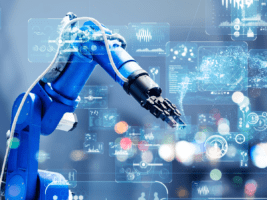Introduction
In the digital age, manufacturing is undergoing a revolutionary shift, moving from traditional production methods to smart manufacturing. Central to this transformation are smart machining centers, technologically advanced facilities that optimize efficiency, precision, and adaptability in production processes. This article explores the pivotal role of this advancement in facilitating the transition to smart manufacturing.
Smart Machining Centers: The Heart of Industry 4.0
Smart machining centers are at the heart of the Fourth Industrial Revolution, also known as Industry 4.0. These extremely sophisticated facilities leverage pristine, state-of-the-art technologies such as Artificial Intelligence (AI), the Internet of Things (IoT), and machine learning to automate and streamline manufacturing processes. The result is a marked increase in productivity, accuracy, and profitability, all of which are vital in today’s increasingly competitive manufacturing landscape.
Real-time Monitoring and Efficiency Enhancement
The role of smart machining centers in smart manufacturing is multifaceted. By using advanced sensors and networking capabilities, these centers are able to monitor production processes in real-time, providing actionable insights to enhance efficiency.
They can predict potential issues before they arise, reducing costly downtime and maintaining seamless production flows. Through AI-driven analytics, smart machining centers have the ability to optimize machine usage and resource allocation, significantly reducing waste and boosting sustainability.
Precision and Consistency
Smart machining centers also offer unparalleled precision and consistency. By employing high-resolution sensors and advanced algorithms, these centers ensure that every product meets even the most stringent quality standards. This ability to maintain consistent high-quality production is particularly crucial in industries where precision is paramount, such as aerospace, medical technology, and automotive manufacturing.
Adaptability and Flexibility
The adaptability of smart machining centers is another critical factor driving the shift towards smart manufacturing. In traditional production lines, modifying the manufacturing process to accommodate new product designs can be costly and time-consuming. In contrast, smart machining centers can easily adjust to changes in product design or demand by reprogramming their systems. This flexibility allows manufacturers to rapidly respond to market changes, effectively reducing lead times and maintaining a competitive edge.
Integration of IoT and Interconnectivity
The integration of IoT in smart machining centers also fosters seamless interconnectivity between machines, systems, and people. It enables real-time data sharing across different stages of the manufacturing process, fostering collaboration and improving decision-making. By giving manufacturers a holistic view of their operations, IoT integration helps identify bottlenecks, optimize workflows, and ultimately, increase overall operational efficiency.
Predictive Maintenance
Smart machining centers play a pivotal role in predictive maintenance. By analyzing data patterns, these centers have the ability to predict machinery failures before they happen, thereby enabling proactive maintenance. This not only reduces downtime but also extends the life of the machinery, leading to significant cost savings in the long run.
Conclusion
In summary, smart machining centers are a cornerstone of smart manufacturing, offering an impressive array of benefits. Their ability to optimize production processes, enhance precision, and adapt to changing demands makes them an essential tool in modern manufacturing. Through real-time monitoring, AI-driven analytics, and IoT integration, these centers are revolutionizing the manufacturing sector, driving productivity, reducing costs, and paving the way for a more sustainable future. As the shift towards smart manufacturing continues to gain momentum, the role of smart machining centers will only grow in importance.
In the era of Industry 4.0, the evolution of manufacturing is inevitable, and smart machining centers stand at the forefront of this change. By embracing these technologies, manufacturers can stay ahead of the curve, ensuring they remain competitive in an ever-evolving industrial landscape. It is clear that smart machining centers are not just a part of the future of manufacturing – they are the future.
 Action Machinery
Action Machinery 
